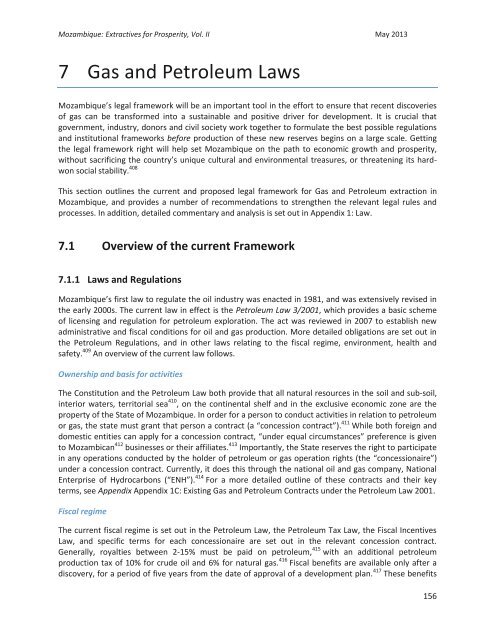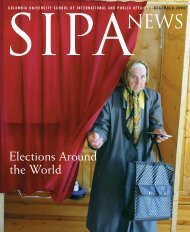Mozambique - School of International and Public Affairs - Columbia ...
Mozambique - School of International and Public Affairs - Columbia ...
Mozambique - School of International and Public Affairs - Columbia ...
You also want an ePaper? Increase the reach of your titles
YUMPU automatically turns print PDFs into web optimized ePapers that Google loves.
<strong>Mozambique</strong>: Extractives for Prosperity, Vol. II May 2013<br />
7 Gas <strong>and</strong> Petroleum Laws<br />
<strong>Mozambique</strong>’s legal framework will be an important tool in the effort to ensure that recent discoveries<br />
<strong>of</strong> gas can be transformed into a sustainable <strong>and</strong> positive driver for development. It is crucial that<br />
government, industry, donors <strong>and</strong> civil society work together to formulate the best possible regulations<br />
<strong>and</strong> institutional frameworks before production <strong>of</strong> these new reserves begins on a large scale. Getting<br />
the legal framework right will help set <strong>Mozambique</strong> on the path to economic growth <strong>and</strong> prosperity,<br />
without sacrificing the country’s unique cultural <strong>and</strong> environmental treasures, or threatening its hardwon<br />
social stability. 408<br />
This section outlines the current <strong>and</strong> proposed legal framework for Gas <strong>and</strong> Petroleum extraction in<br />
<strong>Mozambique</strong>, <strong>and</strong> provides a number <strong>of</strong> recommendations to strengthen the relevant legal rules <strong>and</strong><br />
processes. In addition, detailed commentary <strong>and</strong> analysis is set out in Appendix 1: Law.<br />
7.1 Overview <strong>of</strong> the current Framework<br />
7.1.1 Laws <strong>and</strong> Regulations<br />
<strong>Mozambique</strong>’s first law to regulate the oil industry was enacted in 1981, <strong>and</strong> was extensively revised in<br />
the early 2000s. The current law in effect is the Petroleum Law 3/2001, which provides a basic scheme<br />
<strong>of</strong> licensing <strong>and</strong> regulation for petroleum exploration. The act was reviewed in 2007 to establish new<br />
administrative <strong>and</strong> fiscal conditions for oil <strong>and</strong> gas production. More detailed obligations are set out in<br />
the Petroleum Regulations, <strong>and</strong> in other laws relating to the fiscal regime, environment, health <strong>and</strong><br />
safety. 409 An overview <strong>of</strong> the current law follows.<br />
Ownership <strong>and</strong> basis for activities<br />
The Constitution <strong>and</strong> the Petroleum Law both provide that all natural resources in the soil <strong>and</strong> sub-soil,<br />
interior waters, territorial sea 410 , on the continental shelf <strong>and</strong> in the exclusive economic zone are the<br />
property <strong>of</strong> the State <strong>of</strong> <strong>Mozambique</strong>. In order for a person to conduct activities in relation to petroleum<br />
or gas, the state must grant that person a contract (a “concession contract”). 411 While both foreign <strong>and</strong><br />
domestic entities can apply for a concession contract, “under equal circumstances” preference is given<br />
to Mozambican 412 businesses or their affiliates. 413 Importantly, the State reserves the right to participate<br />
in any operations conducted by the holder <strong>of</strong> petroleum or gas operation rights (the “concessionaire”)<br />
under a concession contract. Currently, it does this through the national oil <strong>and</strong> gas company, National<br />
Enterprise <strong>of</strong> Hydrocarbons (“ENH”). 414 For a more detailed outline <strong>of</strong> these contracts <strong>and</strong> their key<br />
terms, see Appendix Appendix 1C: Existing Gas <strong>and</strong> Petroleum Contracts under the Petroleum Law 2001.<br />
Fiscal regime<br />
The current fiscal regime is set out in the Petroleum Law, the Petroleum Tax Law, the Fiscal Incentives<br />
Law, <strong>and</strong> specific terms for each concessionaire are set out in the relevant concession contract.<br />
Generally, royalties between 2-15% must be paid on petroleum, 415 with an additional petroleum<br />
production tax <strong>of</strong> 10% for crude oil <strong>and</strong> 6% for natural gas. 416 Fiscal benefits are available only after a<br />
discovery, for a period <strong>of</strong> five years from the date <strong>of</strong> approval <strong>of</strong> a development plan. 417 These benefits<br />
156

















